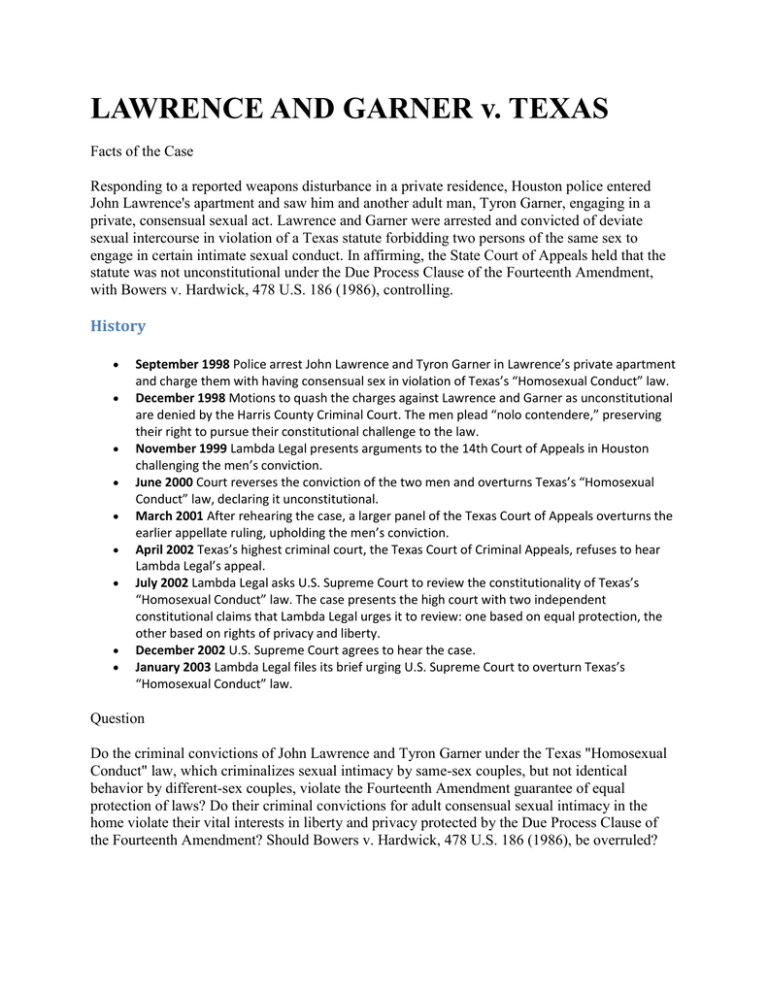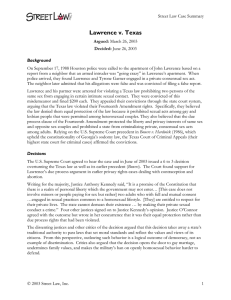
LAWRENCE AND GARNER v. TEXAS
Facts of the Case
Responding to a reported weapons disturbance in a private residence, Houston police entered
John Lawrence's apartment and saw him and another adult man, Tyron Garner, engaging in a
private, consensual sexual act. Lawrence and Garner were arrested and convicted of deviate
sexual intercourse in violation of a Texas statute forbidding two persons of the same sex to
engage in certain intimate sexual conduct. In affirming, the State Court of Appeals held that the
statute was not unconstitutional under the Due Process Clause of the Fourteenth Amendment,
with Bowers v. Hardwick, 478 U.S. 186 (1986), controlling.
History
September 1998 Police arrest John Lawrence and Tyron Garner in Lawrence’s private apartment
and charge them with having consensual sex in violation of Texas’s “Homosexual Conduct” law.
December 1998 Motions to quash the charges against Lawrence and Garner as unconstitutional
are denied by the Harris County Criminal Court. The men plead “nolo contendere,” preserving
their right to pursue their constitutional challenge to the law.
November 1999 Lambda Legal presents arguments to the 14th Court of Appeals in Houston
challenging the men’s conviction.
June 2000 Court reverses the conviction of the two men and overturns Texas’s “Homosexual
Conduct” law, declaring it unconstitutional.
March 2001 After rehearing the case, a larger panel of the Texas Court of Appeals overturns the
earlier appellate ruling, upholding the men’s conviction.
April 2002 Texas’s highest criminal court, the Texas Court of Criminal Appeals, refuses to hear
Lambda Legal’s appeal.
July 2002 Lambda Legal asks U.S. Supreme Court to review the constitutionality of Texas’s
“Homosexual Conduct” law. The case presents the high court with two independent
constitutional claims that Lambda Legal urges it to review: one based on equal protection, the
other based on rights of privacy and liberty.
December 2002 U.S. Supreme Court agrees to hear the case.
January 2003 Lambda Legal files its brief urging U.S. Supreme Court to overturn Texas’s
“Homosexual Conduct” law.
Question
Do the criminal convictions of John Lawrence and Tyron Garner under the Texas "Homosexual
Conduct" law, which criminalizes sexual intimacy by same-sex couples, but not identical
behavior by different-sex couples, violate the Fourteenth Amendment guarantee of equal
protection of laws? Do their criminal convictions for adult consensual sexual intimacy in the
home violate their vital interests in liberty and privacy protected by the Due Process Clause of
the Fourteenth Amendment? Should Bowers v. Hardwick, 478 U.S. 186 (1986), be overruled?
Conclusion
Decision: 6 votes for Lawrence and Garner, 3 vote(s) against
Legal provision: Due Process
No, yes, and yes. In a 6-3 opinion delivered by Justice Anthony M. Kennedy, the Court held that
the Texas statute making it a crime for two persons of the same sex to engage in certain intimate
sexual conduct violates the Due Process Clause. After explaining what it deemed the doubtful
and overstated premises of Bowers, the Court reasoned that the case turned on whether Lawrence
and Garner were free as adults to engage in the private conduct in the exercise of their liberty
under the Due Process Clause. "Their right to liberty under the Due Process Clause gives them
the full right to engage in their conduct without intervention of the government," wrote Justice
Kennedy. "The Texas statute furthers no legitimate state interest which can justify its intrusion
into the personal and private life of the individual," continued Justice Kennedy. Accordingly, the
Court overruled Bowers. Justice Sandra Day O'Connor filed an opinion concurring in the
judgment. Justices Clarence Thomas and Antonin Scalia, with whom Chief Justice William H.
Rehnquist and Justices Thomas joined, filed dissents.
Questions:
1. Does an individual have a right to privacy in the United States? Explain.
2. Section I of the Fourteenth Amendment to the U.S. Constitution reads as follows: All
persons born or naturalized in the United States and subject to the jurisdiction
thereof, are citizens of the United States and of the State wherein they reside. No
State shall make or enforce any law which shall abridge the privileges or immunities
of citizens of the United States; nor shall any State deprive any person of life,
liberty, or property, without due process of law; nor deny to any person within
its jurisdiction the equal protection of the laws. Could the Due Process Clause (in
bold type above) create an individual right to privacy? Explain.
3. How might gay rights be associated with an individual right to privacy?
4. What is the balance between the U.S. Constitution and state laws regulating criminal
behavior? How does this balance impact gay rights?
5. Some Supreme Court Justices believe that it is their duty to seek the original
meaning of the U.S. Constitution and apply it to contemporary laws. Other Justices
contend the document is instead living, and must be adapted to meet new
challenges that arise across time. What approach(es) is(are) in play in each of these
three cases? Which do you find most compelling?
6. Opposition to homosexuality and gay rights often centers on moral arguments
rooted in religion. To what degree should morality and/or religion be reflected in
the law?







